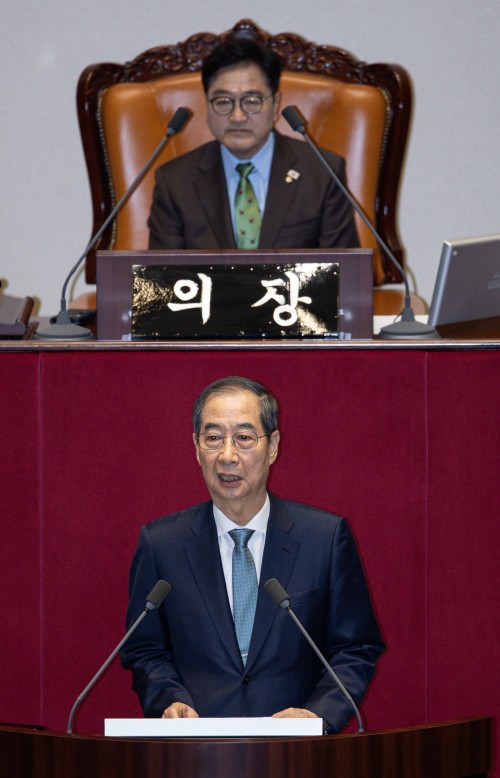 |
| Han Duck-soo, acting president and prime minister, delivers a policy speech on the 2025 first supplementary budget during a plenary session at the National Assembly in Seoul on April 24. / Photo by Song Ui-joo, songuijoo@ |
Acting President and Prime Minister Han Duck-soo on April 24 appealed to the National Assembly to promptly review and pass this year’s first supplementary budget worth 12.2 trillion won (approx. $9 billion), emphasizing the urgency of delivering fiscal support amid overlapping national crises.
Delivering a policy speech in parliament, Han stressed that “the timing of crisis response is just as critical as the policy itself,” and asked lawmakers to “urgently deliberate and approve the bill so that state funds can be swiftly deployed where they are most needed.”
Submitted on April 21, the extra budget proposal targets three main areas: 3.2 trillion won for disaster and emergency response; 4.4 trillion won to support trade and artificial intelligence development; and 4.3 trillion won for stabilizing public livelihoods. Han said the government carefully selected only “highly effective, essential projects” for inclusion.
Regarding the trade crisis triggered by U.S. tariffs, Han announced an additional 1.5 trillion won in funding for state-run policy finance institutions. The government also plans to expand the “export voucher” program—designed to help companies facing tariff-related export disruptions—from 3,000 firms to about 8,000.
Aggressive investment in AI was another focal point. Han outlined measures such as: securing 10,000 high-performance GPUs by the end of the year; assembling a “national elite AI team” with top private-sector firms; developing a Korean large language model (LLM) on par with ChatGPT; nurturing 3,300 AI professionals at the graduate level; and expanding a 200 billion won innovation fund for AI-focused startups and SMEs.
The budget also earmarks support for Korea’s semiconductor infrastructure. Plans include government coverage of 70% of power grid undergrounding costs for the Yongin-Pyeongtaek semiconductor cluster, a 200 billion won fund for low-interest loans on facility investments, and newly established subsidies for small and mid-sized materials and component manufacturers.
In disaster relief, the budget allocates a threefold increase in emergency recovery funds—from 500 billion won to 1.5 trillion won—mainly for wildfire damage recovery. It also includes support for 1,000 new rental homes and low-interest housing repair loans for displaced residents.
Most Read
-
1
-
2
-
3
-
4
-
5
-
6
-
7





















